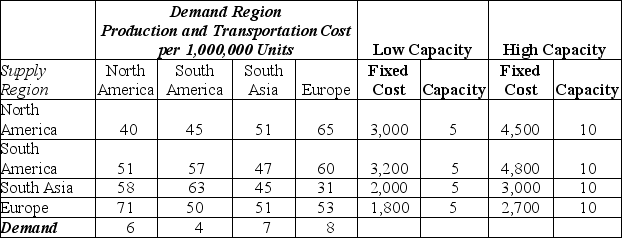Multiple Choice
Future Plastics manufactures plastic products for industrial use worldwide. In order to meet demand, they are considering setting up a facility in each region in order to lower transportation cost and to possibly avoid duties that could be imposed if the product is imported from another region. The disadvantage of this approach is that plants are sized to meet local demand and may not fully exploit economies of scale. Therefore, Future Plastics is also interested in determining the appropriate size of the facility to build in each location and are choosing between facilities with capacities of 5 or 10 million.
The fixed costs of each facility as well as the cost of shipping between regions is shown in the table below. The decision variables are defined as follows:
Xij = quantity shipped from supply region i to demand region j. i = 1, 2, 3, 4 and j = 1, 2, 3, 4.
Yik = 1 if facility k is selected for supply region i; 0 otherwise, where i = 1, 2, 3, 4 for each supply region; k = 1 (low capacity facility) or 2 (high capacity facility)

-Max Z = 5x1 + 6x2
Subject to17x1 + 8x2 ? 136
3x1 + 4x2 ? 36
X1, x2 ? 0 and integer
What is the optimal solution?
A) x1 = 6, x2 = 4, Z = 54
B) x1 = 3, x2 = 6, Z = 51
C) x1 = 2, x2 = 6, Z = 46
D) x1 = 4, x2 = 6, Z = 56
Correct Answer:

Verified
Correct Answer:
Verified
Q97: In a mixed integer model, all decision
Q98: Rounding down integer solution values ensures an
Q99: The Wiethoff Company has a contract
Q100: In the classic game show <i>Password,</i> the
Q101: You have been asked to select at
Q102: In a mixed integer model, the solution
Q104: Which of the following is <b><i>not</i></b> an
Q105: An optimal solution to an integer programming
Q106: <b>The Exorbitant Course Fees.</b> The $75
Q107: The Wiethoff Company has a contract